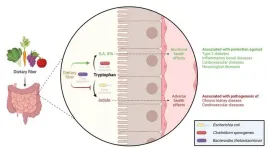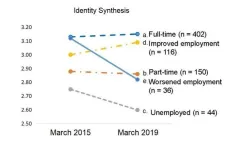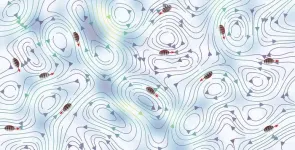(Press-News.org) We get healthy dietary fibres from consuming fruits, vegetables, and whole grains. But why are the fibres so good for us? A team of researchers has discovered that dietary fibres play a crucial role in determining the balance between the production of healthy and harmful substances by influencing the behaviour of bacteria in the colon.
Dietary fibres benefit our health, and scientists from DTU National Food Institute and the Department of Nutrition, Exercise and Sports at the University of Copenhagen have now uncovered an essential part of why this is the case. Different types of bacteria inside our colon compete to utilize an essential amino acid called tryptophan. This competition may lead to either good or bad outcomes for our health. The research, published in the scientific journal Nature Microbiology, reveals that when we eat many dietary fibres, gut bacteria help turn tryptophan into healthy substances. But if we don't eat enough fibres, tryptophan can be converted into harmful compounds by our gut bacteria.
"These results emphasize that our dietary habits significantly influence the behaviour of gut bacteria, creating a delicate balance between health-promoting and disease-associated activities. In the long term, the results can help us design dietary programs that prevent a range of diseases," says a professor at DTU National Food Institute, Tine Rask Licht.
Dietary fibres determine the battle over tryptophan.
Researchers have long known that dietary fibres are directly converted into healthy short-chain fatty acids by gut bacteria in the colon. However, the new study surprisingly shows that dietary fibres also contribute to good health by preventing the conversion of the amino acid tryptophan into harmful substances and promoting its conversion into beneficial substances in the colon.
"The gut bacterium E. coli can turn tryptophan into a harmful compound called indole, which is associated with the progression of chronic kidney disease. But another gut bacterium, C. sporogenes, turns tryptophan into healthy substances associated with protection against inflammatory bowel diseases, type 2 diabetes, cardiovascular diseases, and neurological diseases," says Anurag Kumar Sinha, a DTU National Food Institute researcher.
Through multiple experiments in bacterial cultures and mice, the researchers demonstrated that fibre-degrading gut bacteria, such as B. thetaiotaomicron, regulate the indole-forming activity of E. coli.
"B. thetaiotaomicron assists by breaking down fibres into simple sugars, which E. coli prefers over tryptophan for growth. The sugar components from the fibres prevent E. coli from turning tryptophan into indole, thereby allowing C. sporogenes to utilize tryptophan to produce healthy compounds," says Anurag Kumar Sinha.
Understanding the behaviour of gut bacteria
It is well-known that dietary fibres can alter the composition and quantities of bacteria in our gut microbiome. However, looking merely at the composition and abundance of gut microbial species will not tell us much about their impact on our health.
"The gut microbiome research field has had a strong focus on assessing effects, e.g. of diet on the quantity of potentially good or bad gut bacteria, but often neglect that diet can regulate the gut bacteria's activity without necessarily making major changes in the number of bacterial species in the colon," says an associate professor at DTU National Food Institute, Martin Frederik Laursen.
So, dietary fibres not only help modify the types of bacteria in the gut, leading to a healthier composition, but they also influence the behaviour of gut bacteria in ways that promote health.
"As a research community we need to change focus from viewing gut bacteria and their abundances strictly as either good or bad – to understand instead how we make our gut bacteria behave good or bad." says Martin Frederik Laursen.
This understanding can help scientists develop better dietary recommendations that keep our gut healthy and prevent diseases.
Facts
Essential amino acids, such as tryptophan, must be obtained through the diet since the body cannot synthesize them.
Protein-rich foods serve as sources of tryptophan. Examples include chicken, turkey, salmon, tuna, eggs, milk, cheese, yogurt, legumes, nuts, and seeds.
Dietary fibres are present in fruits, vegetables, and whole grains.
Original study title: "Dietary fibre directs microbial tryptophan metabolism via metabolic interactions in the gut microbiota"
END
Dietary fibers make our gut bacteria behave healthy
A team of researchers has discovered that dietary fibres play a crucial role in determining the balance between the production of healthy and harmful substances by influencing the behaviour of bacteria in the colon.
2024-06-25
ELSE PRESS RELEASES FROM THIS DATE:
Study links gut microbiome changes to increased risk of type 2 diabetes
2024-06-25
The largest and most ethnically and geographically comprehensive investigation to date of the gut microbiome of people with type 2 diabetes (T2D), prediabetes, and healthy glucose status has found that specific viruses and genetic variants within bacteria correspond with changes in gut microbiome function and T2D risk. Results of the study—which represents a collaboration across Brigham and Women’s Hospital (a founding member of the Mass General Brigham healthcare system), the Broad Institute of MIT and Harvard, and Harvard T.H. Chan School of Public Health—are published in Nature Medicine.
"The microbiome is highly variable across different geographic ...
NYU Abu Dhabi researchers present new evidence for how heat is transported below the sun’s surface
2024-06-25
Abu Dhabi, UAE, June 25, 2024: A team of solar physicists at NYU Abu Dhabi’s Center for Astrophysics and Space Science (CASS), led by Research Scientist Chris S. Hanson, Ph.D., has revealed the interior structure of the sun’s supergranules, a flow structure that transports heat from the sun’s hidden interior to its surface. The researchers’ analysis of the supergranules presents a challenge to the current understanding of solar convection.
The sun generates energy in its core through nuclear fusion; that energy is then transported to ...
Gene variant may underlie diabetes disparities: study
2024-06-25
A genetic variation common in people of African ancestry is associated with an increased risk of complications from diabetes, including diabetic retinopathy, according to a report published June 25 in the journal Nature Medicine.
The investigators found that the diagnosis of diabetes and treatment needed to prevent diabetes complications may be delayed in people who carry the variant, G6PDdef, because it is associated with reduced levels of HbA1c, a widely used clinical marker of blood glucose levels.
Testing for genetic variations that cause G6PD ...
Scientists identify safe havens we must preserve to prevent ‘the sixth great extinction of life on Earth’
2024-06-25
In a groundbreaking new article, a coalition of conservationists and researchers have shown how we can protect Earth’s remaining biodiversity by conserving just a tiny percentage of the planet’s surface. This affordable, achievable plan would make it possible for us to preserve the most threatened species from extinction, safeguarding Earth’s wildlife for the future.
“Most species on Earth are rare, meaning that species either have very narrow ranges or they occur at very low densities ...
FRONTIERS opens new call for science journalism in residency program
2024-06-25
Today, the FRONTIERS Science Journalism Initiative opens the second call for applications for its science journalism in residency programme. The application period will remain open until the 25th of September 2024, at 17:00 CEST.
Funded by the European Research Council (ERC), this initiative offers science journalists the opportunity to develop independent journalism while spending three to five months in a host research institution, located in an EU Member State or a country associated with the EU’s Horizon Europe Programme. The residency ...
Beyond work: Employment affects identity in late 20-somethings
2024-06-25
Osaka, Japan — For people in their late 20s, “Your job doesn’t define you” is likely an unconvincing cliché.
Osaka Metropolitan University researchers have unveiled critical insights into the intricate relationships between employment status, identity development and life satisfaction among Japanese individuals in late emerging adulthood, or their late 20s, highlighting the importance of stable employment during this pivotal life stage.
Their findings were published in the Journal of Youth and Adolescence on May 15.
Identity reflects a sense of self and is closely ...
Model shows how plankton survive in a turbulent world
2024-06-25
How do particles move in turbulent fluids? The answer to this question can be found in a new model presented in a thesis from the University of Gothenburg. The model could help speed up the development of new drugs.
When you stir a glass of water, it is easy to think that any particles in the water will end up in chaos and move completely randomly. But this is not always the case. For example, the so-called active micro-swimmers can move through flow on their own. Navid Mousavi, a PhD student at the University of Gothenburg, has created a model including various hydrodynamic factors to study how these particles handle and even ...
Study: Teacher perceptions of chronically absent young students may add to the challenges of missing school
2024-06-25
Washington, June 25, 2024—A new study finds that early elementary school teachers report feeling less close to chronically absent students and view them less positively, even when those students do not cause trouble in the classroom. This “cooling down” in the relationship between teachers and their chronically absent students may exacerbate the academic challenges these children face.
The study—by Michael A. Gottfried and Phil H. Kim at the University of Pennsylvania, and Tina Fletcher at the ...
All-in-one method measures CO2 in concrete
2024-06-25
A new device can measure carbon dioxide captured in concrete more simply and in a third of the time of current methods. Researchers at the University of Tokyo worked with engineers in industry to create the boxlike device called the concrete thermal gravimetry and gas analyzer. The device heats concrete samples to almost 1,000 degrees Celsius, causing the CO2 within to be released so it can be measured. Compared to the current technique, which involves a time-consuming and complicated process of crushing concrete samples into powder for sampling, this new method is simpler, more accurate and user-friendly. The researchers hope it ...
Internet for billions in 100 countries with no current access and hope for transplant patients worldwide in new World Economic Forum emerging technologies report
2024-06-25
The World Economic Forum, in association with Frontiers, new Top 10 Emerging Technologies of 2024, released today (25 June), shows that among technologies emerging globally, reconfigurable intelligent surfaces (RIS) and High-Altitude Platform Systems (HAPS) have the potential to connect billions worldwide who currently have no internet access.
The report also highlights how advances in genetically engineering animal organs for use in human transplantation gives hope to the millions on waiting lists worldwide. Other technologies in the top ten that that could transform lives and societies ...
LAST 30 PRESS RELEASES:
Genetic risk for mental illness is far less disorder-specific than clinicians have assumed, massive Swedish study reveals
A therapeutic target that would curb the spread of coronaviruses has been identified
Modern twist on wildfire management methods found also to have a bonus feature that protects water supplies
AI enables defect-aware prediction of metal 3D-printed part quality
Miniscule fossil discovery reveals fresh clues into the evolution of the earliest-known relative of all primates
World Water Day 2026: Applied Microbiology International to hold Gender Equality and Water webinar
The unprecedented transformation in energy: The Third Energy Revolution toward carbon neutrality
Building on the far side: AI analysis suggests sturdier foundation for future lunar bases
Far-field superresolution imaging via k-space superoscillation
10 Years, 70% shift: Wastewater upgrades quietly transform river microbiomes
Why does chronic back pain make everyday sounds feel harsher? Brain imaging study points to a treatable cause
Video messaging effectiveness depends on quality of streaming experience, research shows
Introducing the “bloom” cycle, or why plants are not stupid
The Lancet Oncology: Breast cancer remains the most common cancer among women worldwide, with annual cases expected to reach over 3.5 million by 2050
Improve education and transitional support for autistic people to prevent death by suicide, say experts
GLP-1 drugs like Ozempic could cut risk of major heart complications after heart attack, study finds
Study finds Earth may have twice as many vertebrate species as previously thought
NYU Langone orthopedic surgeons present latest clinical findings and research at AAOS 2026
New journal highlights how artificial intelligence can help solve global environmental crises
Study identifies three diverging global AI pathways shaping the future of technology and governance
Machine learning advances non targeted detection of environmental pollutants
ACP advises all adults 75 or older get a protein subunit RSV vaccine
New study finds earliest evidence of big land predators hunting plant-eaters
Newer groundwater associated with higher risk of Parkinson’s disease
New study identifies growth hormone receptor as possible target to improve lung cancer treatment
Routine helps children adjust to school, but harsh parenting may undo benefits
IEEE honors Pitt’s Fang Peng with medal in power engineering
SwRI and the NPSS Consortium release new version of NPSS® software with improved functionality
Study identifies molecular cause of taste loss after COVID
Accounting for soil saturation enhances atmospheric river flood warnings
[Press-News.org] Dietary fibers make our gut bacteria behave healthyA team of researchers has discovered that dietary fibres play a crucial role in determining the balance between the production of healthy and harmful substances by influencing the behaviour of bacteria in the colon.








